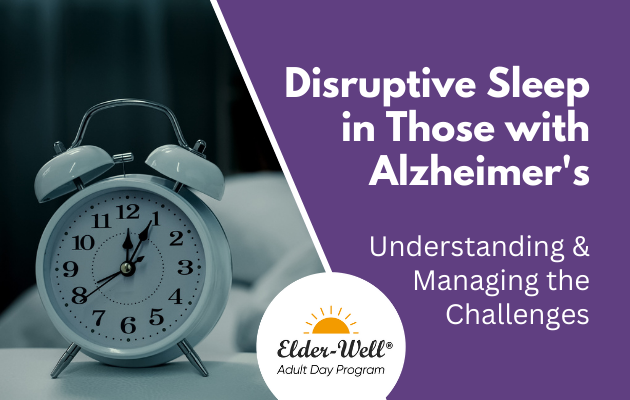Disruptive Sleep in Those with Alzheimer’s: Understanding and Managing the Challenges

Caring for someone with Alzheimer’s disease presents a unique set of challenges, and one of the most common issues that caregivers encounter is disruptive sleep patterns. Sleep disturbances are prevalent among individuals with Alzheimer’s, and they can have a significant impact on both the person with the disease and their caregivers. Let’s explore the causes of disruptive sleep in those with Alzheimer’s and offer practical tips on how to manage these challenges effectively.
Understanding Disruptive Sleep Patterns in Alzheimer’s:
- Changes in the Brain: Alzheimer’s disease affects the brain, leading to structural and chemical changes that disrupt the sleep-wake cycle. The brain’s ability to regulate sleep becomes compromised, causing irregular sleep patterns.
- Sundowning: Many individuals with Alzheimer’s experience a phenomenon known as “sundowning.” This involves increased agitation, confusion, and restlessness in the late afternoon and evening, making it difficult for them to settle down for the night.
- Physical Health Issues: Common physical issues associated with Alzheimer’s, such as pain, discomfort, or urinary problems, can lead to nighttime awakenings and difficulty falling back asleep.
- Medications: Some medications used to manage Alzheimer’s symptoms may have side effects that affect sleep patterns. Consult with a healthcare professional to assess the impact of medication on sleep.
Tips for Managing Disruptive Sleep in Alzheimer’s:
- Establish a Routine: Maintain a consistent daily schedule, including regular mealtimes and bedtime routines. Predictability can help regulate sleep patterns.
- Create a Comfortable Sleep Environment: Ensure the sleeping area is comfortable, quiet, and dark. Use blackout curtains if necessary to reduce external light.
- Limit Stimulants: Avoid caffeine and heavy meals close to bedtime. These can disrupt sleep and contribute to nighttime awakenings.
- Encourage Daylight Exposure: Exposure to natural light during the day can help regulate the sleep-wake cycle. Encourage outdoor activities whenever possible.
- Regular Exercise: Engage in gentle, regular physical activity during the day. This can improve overall well-being and promote better sleep.
- Monitor Diet: Adjust the timing of meals and offer a light snack before bedtime if hunger is a concern.
- Minimize Distractions: Remove any potential sleep disruptors from the bedroom, such as TVs or loud clocks. Use white noise machines if necessary.
- Manage Sundowning: Keep evenings calm and quiet. Engage in relaxing activities like reading or listening to soft music to reduce agitation.
- Consult a Healthcare Professional: If sleep disturbances persist, consult a healthcare provider to rule out any underlying medical conditions or medication side effects.
- Consider Medication as a Last Resort: Medication should be considered only as a last resort, and its use should be closely monitored by a healthcare professional.
Disruptive sleep in Alzheimer’s can be challenging for both the person with the disease and their caregivers. By understanding the causes of sleep disturbances and implementing strategies to promote better sleep, caregivers can provide comfort and support to their loved ones. Remember that each person with Alzheimer’s is unique, so it may take some time to find the most effective strategies for managing sleep disruptions. Patience, consistency, and professional guidance can make a significant difference in enhancing the quality of life for those with Alzheimer’s and their caregivers.
Resources for Sleep Disruption in those with Alzheimer’s:
